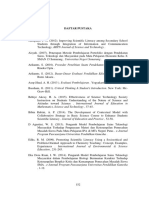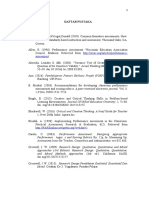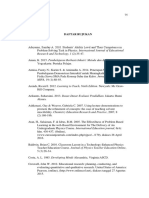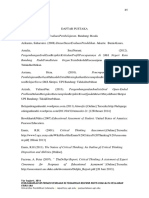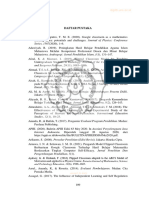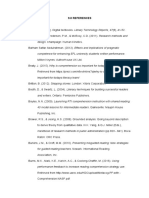0 ratings0% found this document useful (0 votes)
11 viewsScience & Technology Education. 3 (1), 71-81
Science & Technology Education. 3 (1), 71-81
Uploaded by
Nuraini AnnisaThis document contains a list of references (daftar pustaka) in Indonesian. It includes 42 references from 2012 to 2014 related to topics like problem-based learning, critical thinking, innovative learning strategies and models, contextual teaching and learning approaches, and competency-based curriculum. The references are from various sources including journals, books, and publications from Indonesia.
Copyright:
© All Rights Reserved
Available Formats
Download as DOCX, PDF, TXT or read online from Scribd
Science & Technology Education. 3 (1), 71-81
Science & Technology Education. 3 (1), 71-81
Uploaded by
Nuraini Annisa0 ratings0% found this document useful (0 votes)
11 views3 pagesThis document contains a list of references (daftar pustaka) in Indonesian. It includes 42 references from 2012 to 2014 related to topics like problem-based learning, critical thinking, innovative learning strategies and models, contextual teaching and learning approaches, and competency-based curriculum. The references are from various sources including journals, books, and publications from Indonesia.
Original Description:
dafpus
Original Title
DAFTAR PUSTAKA
Copyright
© © All Rights Reserved
Available Formats
DOCX, PDF, TXT or read online from Scribd
Share this document
Did you find this document useful?
Is this content inappropriate?
This document contains a list of references (daftar pustaka) in Indonesian. It includes 42 references from 2012 to 2014 related to topics like problem-based learning, critical thinking, innovative learning strategies and models, contextual teaching and learning approaches, and competency-based curriculum. The references are from various sources including journals, books, and publications from Indonesia.
Copyright:
© All Rights Reserved
Available Formats
Download as DOCX, PDF, TXT or read online from Scribd
Download as docx, pdf, or txt
0 ratings0% found this document useful (0 votes)
11 views3 pagesScience & Technology Education. 3 (1), 71-81
Science & Technology Education. 3 (1), 71-81
Uploaded by
Nuraini AnnisaThis document contains a list of references (daftar pustaka) in Indonesian. It includes 42 references from 2012 to 2014 related to topics like problem-based learning, critical thinking, innovative learning strategies and models, contextual teaching and learning approaches, and competency-based curriculum. The references are from various sources including journals, books, and publications from Indonesia.
Copyright:
© All Rights Reserved
Available Formats
Download as DOCX, PDF, TXT or read online from Scribd
Download as docx, pdf, or txt
You are on page 1of 3
DAFTAR PUSTAKA
Afandi, Sugiyarto, & Sunarno, N. (2012). Pembelajaran Biologi Menggunakan
Pendekatan Metakognitif Melalui Model Reciprocal Learning dan
Problem Based Learning Ditinjau dari Kemandirian Belajar dan
Kemampuan Berpikir Kritis Mahasiswa. Jurnal Inkuiri. 1 (2), 86-92.
Akinoglu, O. & Tandogan, R. O. (2007). The Effects of Problem-Based Active
Learning in Science Education on Students Academic Achievement,
Attitude, and Concept Learning. Eurasia Journal of Mathematics,
Science & Technology Education. 3 (1), 71-81.
Anderson, L. W. & Krathwohl. (2010). Kerangka Landasan untuk Pembelajaran,
Pengajaran, dan Asesmen: Revisi Taksonomi Pendidikan Bloom.
Yogyakarta: Pustaka Pelajar.
Anitah, S. (2009). Teknologi Pembelajaran. Surakarta: UNS Press.
Arends, R. I. (2008). Learning to Teach. New York: McGraw Hill Company.
Arikunto, S. (2010). Prosedur Penelitian: Suatu Pendekatan Praktik Edisi Revisi
2010. Jakarta: Rineka Karya.
Cojocariu, V. M. & Butnaru, C. E. (2014). Asking Questions-Critical Thinking
Tools. Procedia-Social and Behavioral Sciences. 128, 22-28.
Duch, B. J., Groh, S. E., & Allen, D. E. (Eds). (2001). The Power of Problem
Based Learning: A Practical How To for Teaching Undergraduate
Courses in Any Dicipline. Sterling: Stylus Publishing.
Duron, R., Limbach, B., & Waugh, W. (2006). Critical Thinking Framework for
Any Discipline. International Journal of Teaching and Learning in
Higher Education. 17 (2), 160-166.
Facione, P. A. (2013). Critical Thinking: What It is and Why it Counts. Measured
Reasons and The California Academic Press, Millbrae, CA.
Fisher, A. (2008). Critical Thinking: An Introduction. Cambridge: Cambridge
University Press.
Hamruni. (2012). Strategi Pembelajaran. Yogyakarta: Insan Madani.
Hartono, R. (2013). Ragam Model yang Mudah Diterima Murid. Yogyakarta :
Diva Press.
Hasruddin. (2009). Memaksimalkan Kemampuan Berpikir Kritis Melalui
Pendekatan Kontekstual. Jurnal Tabularasa PPS UNIMED. 6 (1), 48-60.
Hill, S. (1996). The Collaborative Classroom: A Guide To Co-operative Learning.
Australia: Eleanor Curtain Publishing.
Johnson, E. B. (2002). Contextual Teaching and Learning: What It Is and Why Its
Here to Stay. California: Corwin Press.
Kalelioglu, F. & Gulbahar, Y. (2014). The Effect of Instructional Techniques on
Critical Thinking and Critical Thinking Dispositions in Online
Discussion. Educational Technology & Society. 17 (1), 248258.
Klein, S. B. (1996). Learning: Principles and Applications. New York: McGrawHill.
Liza, N. A., Karomiah, W., Abdullah, W., & Yunita, A. (2011). Would Problem
Based Learning Affect Students Generic Competencies. African Journal
of Education and Technology. 1 (3), 1-14.
Majid, A. (2013). Strategi Pembelajaran. Bandung: Remaja Rosdakarya.
Masek, A. & Yamin, S. (2011). The Effect of Problem Based Learning on Critical
Thinking Ability: A Theoretical and Empirical Review. International
Review of Social Sciences and Humanities. 2 (1), 215-221.
Mulyasa, E. (2006). Kurikulum Berbasis Kompetensi: Konsep, Karakteristik,
Implementasi, dan Inovasi. Bandung: Remaja Rosdakarya.
Nasution. (2008). Berbagai Pendekatan dalam Proses Belajar Mengajar. Jakarta:
Bumi Aksara.
Rahimi, A. & Sajed, M. A. (2014). The Interplay between Critical Pedagogy and
Critical Thinking: Theoretical ties and practicalities. Procedia-Social and
Behavioral Sciences. 136, 41-45.
Rooikakkers. (2003). Mengajar dengan Sukses: Petunjuk untuk Merencanakan
dan Menyampaikan Pengajaran. Jakarta: Grasindo.
Rusman. (2012). Model-Model Pembelajaran: Mengembangkan Profesionalisme
Guru. Jakarta: Rajawali Pers.
Sudarman. (2007). Problem Based Learning: Suatu Model Pembelajaran untuk
Mengembangkan dan Meningkatkan Kemampuan Memecahkan
Masalah. Jurnal Pendidikan Inovatif. 2 (2).
Sudjana, N. (2005). Penilaian Hasil Proses Belajar Mengajar. Bandung: Remaja
Rosdakarya.
Sugiyanto. (2009). Model-Model Pembelajaran Inovatif. Surakarta: Mata Padi
Presindo.
Sugiyono. (2013). Metode Penelitian Kuantitatif, Kualitatif, dan R & D. Bandung:
Alfa Beta.
Tan, O. (2003). Problem-Based Learning Innovation: Using Problems to Power
Learning in the 21st Century. Singapore: Asia Publishing.
Thomas, I. (2009). Critical Thinking, Transformative Learning, Sustainable
Education, and Problem-Based Learning in Universities. Journal of
Transformative Education. 7 (3), 245-264.
Trianto. (2010). Mendesain Model Pembelajaran Inovatif-Progresif: Konsep,
Landasan, dan Implementasinya pada Kurikulum Tingkat Satuan
Pendidikan (KTSP). Jakarta: Kencana.
Wena, M. (2012). Strategi Pembelajaran Inovatif Kontemporer. Jakarta: Bumi
Aksara.
You might also like
- BlibliographyDocument4 pagesBlibliographyWildanNo ratings yet
- Daftar Pustaka Tesis Concept Attainment + Mind MapDocument6 pagesDaftar Pustaka Tesis Concept Attainment + Mind MapLailatul MasrurohNo ratings yet
- Kurikulum 2013. Jakarta: Bumi Aksara.: Daftar PustakaDocument4 pagesKurikulum 2013. Jakarta: Bumi Aksara.: Daftar PustakaranggaNo ratings yet
- Daftar PustkaDocument5 pagesDaftar PustkazulrahmatNo ratings yet
- Daftar Pustaka PDFDocument5 pagesDaftar Pustaka PDFdiran123No ratings yet
- Daftar PustakaDocument4 pagesDaftar Pustakaanon_315784667No ratings yet
- Daftar PustakaDocument7 pagesDaftar PustakaNiela RifaiNo ratings yet
- Daftar PustakaDocument7 pagesDaftar PustakaLuh Ayu PradnyawatiNo ratings yet
- Daftar PustakaDocument4 pagesDaftar PustakaMuchammadNo ratings yet
- Daftar PustakaDocument5 pagesDaftar PustakaSetiawan BramiantoNo ratings yet
- Daftar PustakaDocument7 pagesDaftar Pustakayustina hasibuanNo ratings yet
- SoalDocument3 pagesSoalThethemeat BengiNo ratings yet
- Daftar PustakaDocument9 pagesDaftar PustakaNiar alhusna niarNo ratings yet
- Daftar PustakaDocument6 pagesDaftar PustakaKhikmatul MungawanahNo ratings yet
- 6) RujukanDocument5 pages6) RujukansyaNo ratings yet
- Kontekstual. Jakarta: Prenadamedia GroupDocument3 pagesKontekstual. Jakarta: Prenadamedia GroupAfwa Setiawan JodiNo ratings yet
- Daftar PustakaDocument11 pagesDaftar PustakaindahNo ratings yet
- Hasil DPDocument5 pagesHasil DPindah natsuNo ratings yet
- SMA Pada Materi Pokok Hidrolisis Garam. Skripsi. UPI Bandung. TidakDocument3 pagesSMA Pada Materi Pokok Hidrolisis Garam. Skripsi. UPI Bandung. Tidaklingga dpsNo ratings yet
- Daftar PustakaDocument4 pagesDaftar PustakaElsaNo ratings yet
- Daftar PustakaDocument2 pagesDaftar PustakadamayNo ratings yet
- Teaching, and Assesing: A Taxonomy of Educational ObjectivesDocument4 pagesTeaching, and Assesing: A Taxonomy of Educational ObjectivesMonica Hella AngelinaNo ratings yet
- Daftar Pustaka: Yati Sumiarti, 2017Document7 pagesDaftar Pustaka: Yati Sumiarti, 2017Tuti AlawiyahNo ratings yet
- RUJUKANDocument5 pagesRUJUKANZoellus Dominic HenryNo ratings yet
- RUJUKANDocument8 pagesRUJUKANnr_azmaNo ratings yet
- Daftar PustakaDocument6 pagesDaftar PustakaSuci nstNo ratings yet
- Nomor 69 Tahun 2013 Tentang Kerangka Dasar Dan Struktur Kurikulum Sekolah Menengah Atas/Madrasah Aliyah. JakartaDocument3 pagesNomor 69 Tahun 2013 Tentang Kerangka Dasar Dan Struktur Kurikulum Sekolah Menengah Atas/Madrasah Aliyah. JakartaFitriatus SabrinaNo ratings yet
- DAFTAR Daftar Referensi Yang DipakaiDocument17 pagesDAFTAR Daftar Referensi Yang Dipakaidianadiarohmah311No ratings yet
- Daftar PustakaDocument4 pagesDaftar PustakaNurhakim Tori MilanistiNo ratings yet
- Assessment: Daftar PustakaDocument5 pagesAssessment: Daftar PustakaalcoNo ratings yet
- CamScanner 23-10-2023 10.32Document12 pagesCamScanner 23-10-2023 10.32Yusuf FerdiNo ratings yet
- RujukanDocument4 pagesRujukanAminNo ratings yet
- F022191031 Tesis DPDocument10 pagesF022191031 Tesis DPAbdul Muhyi AzizNo ratings yet
- Daftar PustakaDocument5 pagesDaftar PustakaAgustian Kahar HidayatNo ratings yet
- Daftar RujukanDocument5 pagesDaftar RujukanDewi Mustika SariNo ratings yet
- Daftar PustakaDocument4 pagesDaftar PustakaArdi RomanzaNo ratings yet
- Daftar PustakaDocument9 pagesDaftar Pustakarisma berkatiNo ratings yet
- BAB VI DAFTAR PUSTAKA 84-87Document4 pagesBAB VI DAFTAR PUSTAKA 84-87Dwi Adelia WardaniNo ratings yet
- Daftar PustakaDocument4 pagesDaftar PustakaRA. FAUZINo ratings yet
- T KIM 1202026 Bibliography PDFDocument5 pagesT KIM 1202026 Bibliography PDFSiti juhairiyahNo ratings yet
- T KIM 1202026 Bibliography PDFDocument5 pagesT KIM 1202026 Bibliography PDFSiti juhairiyahNo ratings yet
- 12 - AnnexuresDocument43 pages12 - AnnexuresDr. K.MALININo ratings yet
- Daftar PustakaDocument5 pagesDaftar PustakaNajmia RahmaNo ratings yet
- RUJUKANDocument7 pagesRUJUKANSiti Hajar Md. YusofNo ratings yet
- Daftar Pustaka PDFDocument5 pagesDaftar Pustaka PDFGo13 TranslatorNo ratings yet
- RujukanDocument3 pagesRujukanaina nabihahNo ratings yet
- DapusDocument3 pagesDapusMonica Meilany GultomNo ratings yet
- Contoh DAFTAR PUSTAKADocument6 pagesContoh DAFTAR PUSTAKATegar PrakarsaNo ratings yet
- Tiar Sugiarti, 2014: Pengembangan Instrumen Penilaian Keterampilan Berfikir Kritis Pada Mata Pelajaran Fisika SmaDocument4 pagesTiar Sugiarti, 2014: Pengembangan Instrumen Penilaian Keterampilan Berfikir Kritis Pada Mata Pelajaran Fisika Smapepi rahmayaniNo ratings yet
- Daftar PustakaDocument11 pagesDaftar PustakaDEBORA NURAININo ratings yet
- BibliografiDocument3 pagesBibliografiRidho Jinzukyushinobi de PaslandzNo ratings yet
- RujukanDocument3 pagesRujukanHand Made MaureenNo ratings yet
- Dapus EditDocument7 pagesDapus EditRina Dyah RahmaNo ratings yet
- Rujukan Bab 2Document3 pagesRujukan Bab 2murshidNo ratings yet
- Teaching, and Assesing A Revision of Bloom's Taxonomy of Education Objectives. New York: Addison Wesley Lonman IncDocument3 pagesTeaching, and Assesing A Revision of Bloom's Taxonomy of Education Objectives. New York: Addison Wesley Lonman IncSaiful Anwar SaifulNo ratings yet
- Daftar PustakaDocument3 pagesDaftar PustakaAdeNo ratings yet
- !references ArDocument8 pages!references ArFelicia OngNo ratings yet
- Daftar PustakaDocument10 pagesDaftar PustakaNadiyah BahtariNo ratings yet
- Teaching in Blended Learning Environments: Creating and Sustaining Communities of InquiryFrom EverandTeaching in Blended Learning Environments: Creating and Sustaining Communities of InquiryRating: 5 out of 5 stars5/5 (5)













